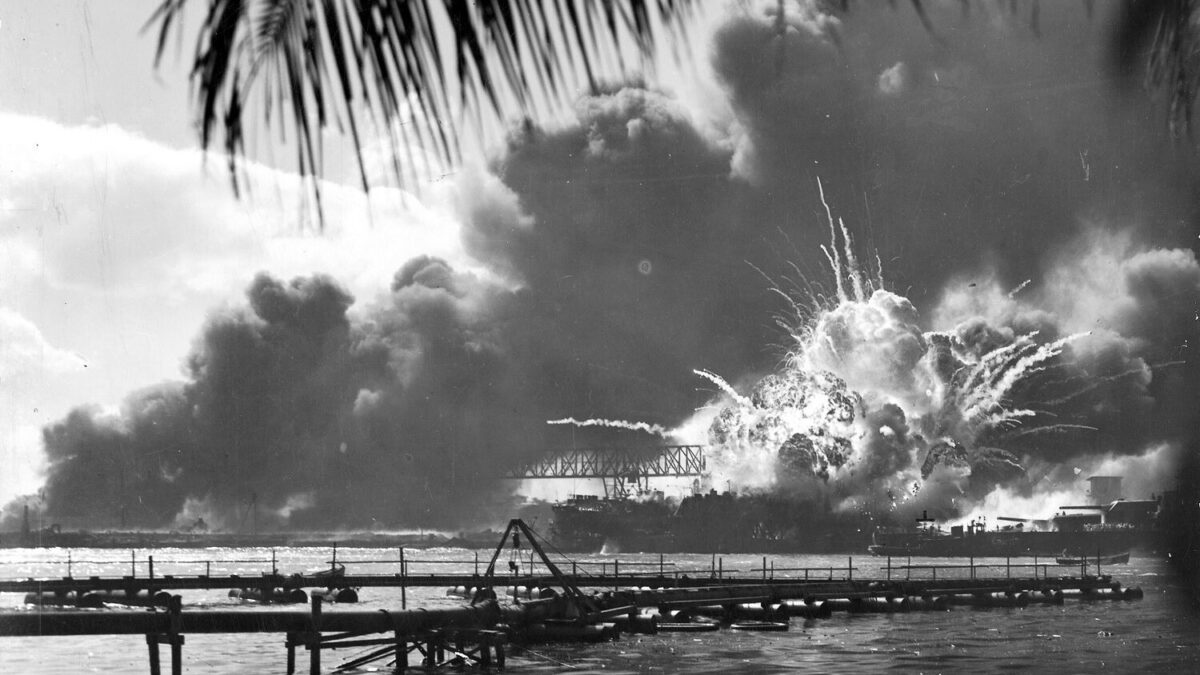Early on the second Sunday of Advent in 1941, sailors, soldiers, and Marines stationed in Hawaii’s Pearl Harbor were relieving the night watch in their anchored ships’ engine rooms, getting back from breakfast, and signing out of their night shifts. A few minutes before 8:00 a.m., some noticed foreign-sounding aircraft overhead, “flying very low.” As bombs started falling from planes painted with the red circles of Japan’s “rising sun,” sailors onboard the more than 100 ships in the harbor began yelling to the other men onboard, some still in bed or fighting “hangovers from being on pass the night before.”
Cecil Camp, who was on watch on the USS Utah, recalled running to the sleeping quarters on the ship, where “water was already washing over my bunk.” In the mess hall, he said, “There were several other men there. One asked if he should take his dress blue uniform with him. I told him he wouldn’t be needing that for a good while.”
The only stories we have are ones from those who survived. Just more than an hour after the attack started, three American ships and 169 American aircraft were destroyed, with another 16 ships and 159 aircraft damaged. The death toll was even worse: 2,335 service members and 68 civilians, with another 1,178 wounded. The next day, the United States would declare war on Japan, formally entering World War II. By the war’s end, roughly 418,500 Americans would lose their lives.
In America in recent years, the cost of her wars has been borne by a smaller contingent of sacrificial volunteers and their families than in the days following Pearl Harbor. Politicians send American troops overseas without declarations of war from Congress, which haven’t been invoked since the 1940s. Thousands of American service members lost their lives in Afghanistan before the botched and disorganized withdrawal from the country led by President Joe Biden’s administration saw the deaths of 13 more brave souls.
Today, our government is recklessly depleting its stockpiles and coffers at the request of Ukrainian President Volodymyr Zelensky. Roughly $70 billion in, we’ve spent far more on Ukraine than our own border security budget, and Biden is asking Congress (and therefore taxpayers) to write a check for another $37 billion, which would send the total amount of U.S. dollars spent on Ukraine aid over 12 figures.
As Bloomberg noted in September, “The US reportedly provided one-third of its overall stockpile of Javelin antitank missiles to Ukraine in the first, most desperate weeks of the fighting. It may take years for Washington and other countries to replenish their armories.” An unnamed defense official said in August that our “level of 155mm combat rounds in U.S. military storage” is now “uncomfortably low” after supplying Ukraine with hundreds of thousands of rounds. Another said stockpiles are “dwindling.” As the United States deepens its involvement in Ukraine at the expense of our own military preparedness, our president is warning of nuclear “Armageddon,” and media outlets are finally admitting the risk of nuclear war is a “daily issue” for his administration.
The decisions of political powerbrokers in Washington have real and sometimes deadly consequences for the American people, not least the brave men and women who fight their wars (many of whom lean conservative and hail from heartland America, unlike most of the political elites who deploy them). After Pearl Harbor, the nation went to war with a constitutional declaration of war from Congress, with a clear mandate from the populace that would be furnishing its lifeblood. Few would dispute that that war, costly though it was, was worth fighting.
In the history of fallen man, there have been just wars, and there have also been silly wars, needlessly escalated by the hubris or foolishness of political powerbrokers. All wars are tragic. None should ever be entered into lightly or haphazardly.
Far be it from me to use the memory of the men and women who died at Pearl Harbor — or in the long years of global war that followed it — to make a political point. But I hope we can agree that there’s nothing political about pausing today to remember the brutality of war, the sacrifices wars require, and our duty as a nation to strive for peace, so far as it depends on us.









